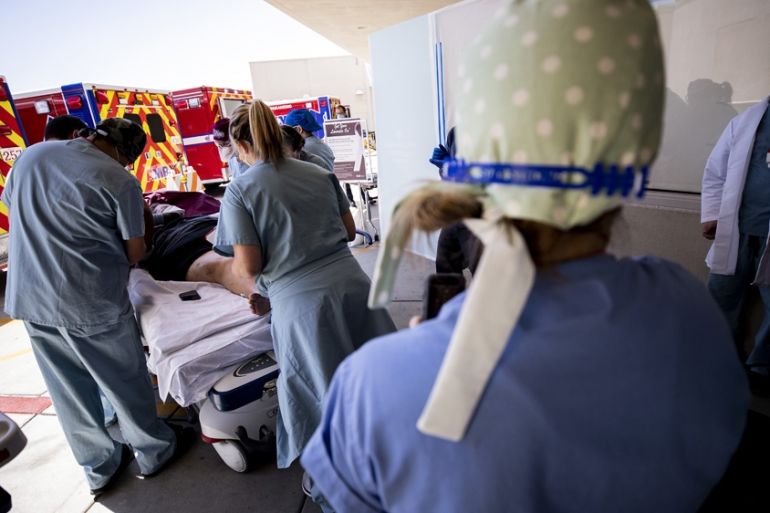Coronavirus second wave fears fuel slump in Asian stocks, oil
Asian markets followed Wall Street lower after US stocks turned in their worst performance since March.

Asian shares fell sharply on Friday after Wall Street and oil tumbled over growing concerns that a resurgence of coronavirus infections could limit any economic recovery as countries reopen from lockdowns.
MSCI’s broadest index of Asia-Pacific shares outside Japan slid 1.3 percent. Australian stocks dropped 1.74 percent, while shares in China fell 0.67 percent.
Keep reading
list of 4 items‘Triple spending’: Zimbabweans bear cost of changing to new ZiG currency
Boeing hit with 32 whistleblower claims, as dead worker’s case reviewed
US imposes new sanctions on Iran after attack on Israel
Oil futures slumped for a second consecutive trading session due to worries about weak global energy demand, which weighed on the currencies of oil producers and countries that rely on exporting commodities.
The Chinese yuan headed for its biggest daily decline in two weeks, underscoring the risk-averse mood.
The three major US stock indexes fell more than 5 percent on Thursday, posting their worst day since mid-March, when markets were shocked by the abrupt economic lockdowns imposed to contain the pandemic.
“All of a sudden the coronavirus, which has been an also-ran story for some days now, became more important as the virus began picking up in some (US) states, and the market began thinking there may be delays to reopening,” said Tim Ghriskey, chief investment strategist at Inverness Counsel in New York.
US stock futures, the S&P 500 e-minis, rose 1.1 percent in Asia on Friday, but that did little to help sentiment.
Japan’s Nikkei stock index slid 1.22 percent, and shares in South Korea fell 2.24 percent as some investors booked profits from a recent rally in global equities.
Coronavirus cases have jumped in several US states in recent days, raising concern among experts who say authorities have loosened restrictions put in place to contain the spread too early.
Cases in New Mexico, Utah and Arizona rose by 40 percent for the week ending Sunday, a Reuters tally showed. Florida and Arkansas are other hot spots.
The US Federal Reserve released a gloomy economic outlook at the end of its two-day monetary policy meeting on Wednesday. Chairman Jerome Powell warned of a “long road” to recovery.
Economic data appeared to back up the Fed’s projections, with jobless claims still more than double their peak during the Great Recession and continuing claims at an astoundingly high 20.9 million.
US crude slid 1.87 percent to $35.66 a barrel, while Brent crude eased 1.43 percent to $38.00 per barrel in Asia on Friday hit by renewed concerns over demand and a large buildup of US crude inventories.
The Mexican peso and the Norwegian krone both fell against the US dollar as the decline in crude prices hurt currencies from oil-producing countries.
Commodity-linked currencies, the Australian and New Zealand dollars, snapped a three-week run of sharp gains.
In the onshore market, the yuan fell 0.3 percent, headed for its biggest daily decline since May 27.
The 10-year US Treasury yield edged up slightly to 0.6853 percent on Friday.
Bond prices were well supported after they rallied following the Fed’s commitment on Wednesday to years of extraordinary support to counter the economic fallout from the pandemic.